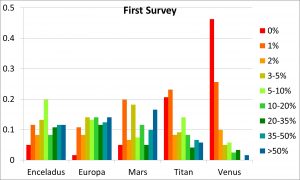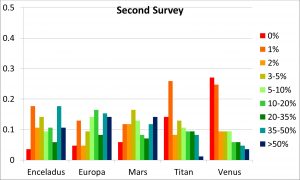A paper out this month summarises two surveys on what people believe about life in the solar system. We asked people with some scientific background in astrobiology what they thought were the chances of life on five Solar System bodies – Europa (a

moon of Jupiter), Enceladus (a small moon of Saturn), Mars, Titan (Saturn’s largest moon), and Venus. People varied in whether they thought Mars or Europa was the most promising for life, but there was a pretty strong consensus that venus was the least likely place to look for life. So far, as predicted.
We did the survey in the summer of 2020.

Then we did it again in autumn of 2002, after Jane Greaves announced that she had tentative evidence that there was phosphine in the atmosphere of Venus. On Earth phosphine is almost exclusively made by life. So did finding phosphine change people’s views of whether life was likely on Venus? We found that Venus was still considered the least likely place to find life among the five bodies we asked about, but the number of people who said there was no chance at all had fallen a lot. The difference for Venus was significant; for all other Solar System bodies there was no significance difference.
This was really a bit of fun, not a serious sociological study (which would have taken more resources than we had). But it suggests that our work on phosphine on Venus had had an impact.